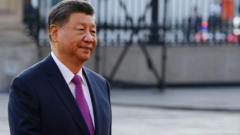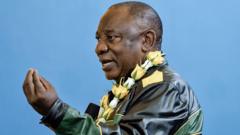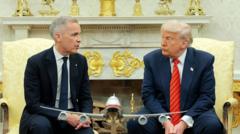The ongoing tariff war between the US and China continues to intensify, with both countries enhancing their strategies amid a backdrop of economic uncertainty. Experts warn of widespread repercussions as the battle for economic dominance escalates.**
Unyielding Standoff: China and Trump's Tariff War Escalate**

Unyielding Standoff: China and Trump's Tariff War Escalate**
As tensions rise between the US and China over tariffs, both nations show no signs of backing down, raising concerns about the long-term economic implications.**
China is firmly standing its ground in the ongoing tariff war initiated by former US President Donald Trump, vowing to "fight to the end" even as the US threatens to escalate tariffs significantly. The prospect of tariffs on Chinese imports could reach an alarming 104%, casting a shadow over key sectors such as technology and consumer goods.
According to experts, the impasse presents a precarious scenario for both economies, with analysts like Alfredo Montufar-Helu from The Conference Board noting that a unilateral tariff reduction by China could portray its leadership as weak. He emphasizes that avoidance of capitulation on both sides is critical to finding a viable resolution, particularly as global markets feel the ripples from this economic standoff.
Asian stock markets have been volatile, with a sharp drop last week following further announcements of US tariff measures. China's quick countermeasures, including retaliatory tariffs and currency devaluation, aim to stabilize its economy in anticipation of a drawn-out conflict. The repercussions of these tariffs are far-reaching, affecting other Asian countries and raising concerns about how economies will adapt to this unfolding scenario.
Trade experts caution that with the two nations so economically intertwined, the path forward remains murky. Deborah Elms from the Hinrich Foundation highlights the risks involved, emphasizing that there are various ways each country can retaliate without tariffs. This complexity leaves the global economy in a state of flux, as other markets are left to adjust in response to a potential loss of Chinese exports.
While there are signs that private negotiations may be attempted, skepticism abounds regarding their potential success. Roland Rajah from the Lowy Institute remarks on the unpredictable nature of these tariffs and the potential for significant repercussions if China decides to employ its full range of retaliatory tools.
The future of US-China relations is uncertain, and experts express concerns about the rapidly escalating situation. With both countries poised to endure economic pain rather than compromise, the question remains: how will this trade conflict ultimately play out in a world already grappling with complex economic challenges?
According to experts, the impasse presents a precarious scenario for both economies, with analysts like Alfredo Montufar-Helu from The Conference Board noting that a unilateral tariff reduction by China could portray its leadership as weak. He emphasizes that avoidance of capitulation on both sides is critical to finding a viable resolution, particularly as global markets feel the ripples from this economic standoff.
Asian stock markets have been volatile, with a sharp drop last week following further announcements of US tariff measures. China's quick countermeasures, including retaliatory tariffs and currency devaluation, aim to stabilize its economy in anticipation of a drawn-out conflict. The repercussions of these tariffs are far-reaching, affecting other Asian countries and raising concerns about how economies will adapt to this unfolding scenario.
Trade experts caution that with the two nations so economically intertwined, the path forward remains murky. Deborah Elms from the Hinrich Foundation highlights the risks involved, emphasizing that there are various ways each country can retaliate without tariffs. This complexity leaves the global economy in a state of flux, as other markets are left to adjust in response to a potential loss of Chinese exports.
While there are signs that private negotiations may be attempted, skepticism abounds regarding their potential success. Roland Rajah from the Lowy Institute remarks on the unpredictable nature of these tariffs and the potential for significant repercussions if China decides to employ its full range of retaliatory tools.
The future of US-China relations is uncertain, and experts express concerns about the rapidly escalating situation. With both countries poised to endure economic pain rather than compromise, the question remains: how will this trade conflict ultimately play out in a world already grappling with complex economic challenges?





















